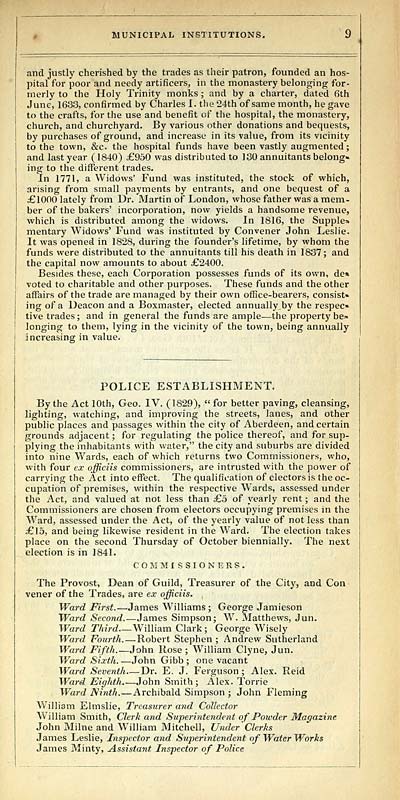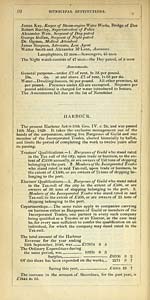Towns > Aberdeen > 1840-1846 - Bon-accord directory > 1841-1842
(23)
Download files
Complete book:
Individual page:
Thumbnail gallery: Grid view | List view

MUNICIPAL INSTITUTIONS.
and justly cherished by the trades as their patron, founded an hos-
pital for poor and needy artificers, in the monastery belonging for-
merly to the Holy Trinity monks ; and by a charter, dated (5th
June, 1633, confirmed by Charles I. the 24th of same month, he gave
to the crafts, for the use and benefit of the hospital, the monastery,
church, and churchyard. By various other donations and bequests,
by purchases of ground, and increase in its value, from its vicinity
to the town, &c. the hospital funds have been vastly augmented ;
and last year ( 1840) £950 was distributed to 130 annuitants belong*
ing to the different trades.
In 1771, a Widows' Fund was instituted, the stock of which,
arising from small payments by entrants, and one bequest of a
£1000 lately from Dr. Martin of London, whose father was a mem-
ber of the bakers' incorporation, now yields a handsome revenue,
which is distributed among the widows. In 1816, the Supple*
mentary Widows' Fund was instituted by Convener John Leslie.
It was opened in 1828, during the founder's lifetime, by whom the
funds were distributed to the annuitants till his death in 1837 ; and
the capital now amounts to about £2400.
Besides these, each Corporation possesses funds of its own, de»
voted to charitable and other purposes. These funds and the other
affairs of the trade are managed by their own office-bearers, consist*
ing of a Deacon and a Boxmaster, elected annuallyby the respec
tive trades ; and in general the funds are ample — the property be-
longing to them, lying in the vicinity of the town, being annually
increasing in value.
POLICE ESTABLISHMENT.
By the Act 10th, Geo. IV. (1829), " for better paving, cleansing,
lighting, watching, and improving the streets, lanes, and other
public places and passages within the city of Aberdeen, and certain
grounds adjacent; for regulating the police thereof, and for sup-
plying the inhabitants with water," the city and suburbs are divided
into nine Wards, each of which returns two Commissioners, who,
with four ex officiis commissioners, are intrusted with the power of
carrying the Act into effect. The qualification of electors is the oc-
cupation of premises, within the respective Wards, assessed under
the Act, and valued at not less than £5 of yearly rent ; and the
Commissioners are chosen from electors occupying premises in the
Ward, assessed under the Act, of the yearly value of not less than
£15, and being likewise resident in the Ward. The election takes
place on the second Thursday of October biennially. The next
election is in 1841.
COMMISSIONERS.
The Provost, Dean of Guild, Treasurer of the City, and Con
vener of the Trades, are ex officiis. ,
Ward First. — James Williams; George Jamieson
Ward Second. — James Simpson; W. Matthews, Jun.
Ward Third William Clark ; George Wisely
Ward Fourth. — Robert Stephen ; Andrew Sutherland
Ward Fifth. — John Rose; William Clyne, Jun.
Ward Sixth. — John Gibb; one vacant
Ward Seventh Dr. E. J. Ferguson ; Alex. Reid
Ward Eighth. — John Smith; Alex. Torrie
Ward Ninth. — Archibald Simpson ; John Fleming
William Elmslie, Treasurer and Collector
William Smith, Clerk and Superintendent of Powder Magazine
John Milne and William Mitchell, Under' Clerks
James Leslie, Inspector and Superintendent of Water Works
James Minty, Assistant Inspector of Police
and justly cherished by the trades as their patron, founded an hos-
pital for poor and needy artificers, in the monastery belonging for-
merly to the Holy Trinity monks ; and by a charter, dated (5th
June, 1633, confirmed by Charles I. the 24th of same month, he gave
to the crafts, for the use and benefit of the hospital, the monastery,
church, and churchyard. By various other donations and bequests,
by purchases of ground, and increase in its value, from its vicinity
to the town, &c. the hospital funds have been vastly augmented ;
and last year ( 1840) £950 was distributed to 130 annuitants belong*
ing to the different trades.
In 1771, a Widows' Fund was instituted, the stock of which,
arising from small payments by entrants, and one bequest of a
£1000 lately from Dr. Martin of London, whose father was a mem-
ber of the bakers' incorporation, now yields a handsome revenue,
which is distributed among the widows. In 1816, the Supple*
mentary Widows' Fund was instituted by Convener John Leslie.
It was opened in 1828, during the founder's lifetime, by whom the
funds were distributed to the annuitants till his death in 1837 ; and
the capital now amounts to about £2400.
Besides these, each Corporation possesses funds of its own, de»
voted to charitable and other purposes. These funds and the other
affairs of the trade are managed by their own office-bearers, consist*
ing of a Deacon and a Boxmaster, elected annuallyby the respec
tive trades ; and in general the funds are ample — the property be-
longing to them, lying in the vicinity of the town, being annually
increasing in value.
POLICE ESTABLISHMENT.
By the Act 10th, Geo. IV. (1829), " for better paving, cleansing,
lighting, watching, and improving the streets, lanes, and other
public places and passages within the city of Aberdeen, and certain
grounds adjacent; for regulating the police thereof, and for sup-
plying the inhabitants with water," the city and suburbs are divided
into nine Wards, each of which returns two Commissioners, who,
with four ex officiis commissioners, are intrusted with the power of
carrying the Act into effect. The qualification of electors is the oc-
cupation of premises, within the respective Wards, assessed under
the Act, and valued at not less than £5 of yearly rent ; and the
Commissioners are chosen from electors occupying premises in the
Ward, assessed under the Act, of the yearly value of not less than
£15, and being likewise resident in the Ward. The election takes
place on the second Thursday of October biennially. The next
election is in 1841.
COMMISSIONERS.
The Provost, Dean of Guild, Treasurer of the City, and Con
vener of the Trades, are ex officiis. ,
Ward First. — James Williams; George Jamieson
Ward Second. — James Simpson; W. Matthews, Jun.
Ward Third William Clark ; George Wisely
Ward Fourth. — Robert Stephen ; Andrew Sutherland
Ward Fifth. — John Rose; William Clyne, Jun.
Ward Sixth. — John Gibb; one vacant
Ward Seventh Dr. E. J. Ferguson ; Alex. Reid
Ward Eighth. — John Smith; Alex. Torrie
Ward Ninth. — Archibald Simpson ; John Fleming
William Elmslie, Treasurer and Collector
William Smith, Clerk and Superintendent of Powder Magazine
John Milne and William Mitchell, Under' Clerks
James Leslie, Inspector and Superintendent of Water Works
James Minty, Assistant Inspector of Police
Set display mode to: Large image | Transcription
Images and transcriptions on this page, including medium image downloads, may be used under the Creative Commons Attribution 4.0 International Licence unless otherwise stated. ![]()
| Scottish Post Office Directories > Towns > Aberdeen > Bon-accord directory > 1841-1842 > (23) |
|---|
| Permanent URL | https://digital.nls.uk/86810180 |
|---|
| Description | Published 1840/41-1845/46. |
|---|---|
| Shelfmark | Various |
| Description | Directories of individual Scottish towns and their suburbs. |
|---|
| Description | Around 700 Scottish directories published annually by the Post Office or private publishers between 1773 and 1911. Most of Scotland covered, with a focus on Edinburgh, Glasgow, Dundee and Aberdeen. Most volumes include a general directory (A-Z by surname), street directory (A-Z by street) and trade directory (A-Z by trade). |
|---|


